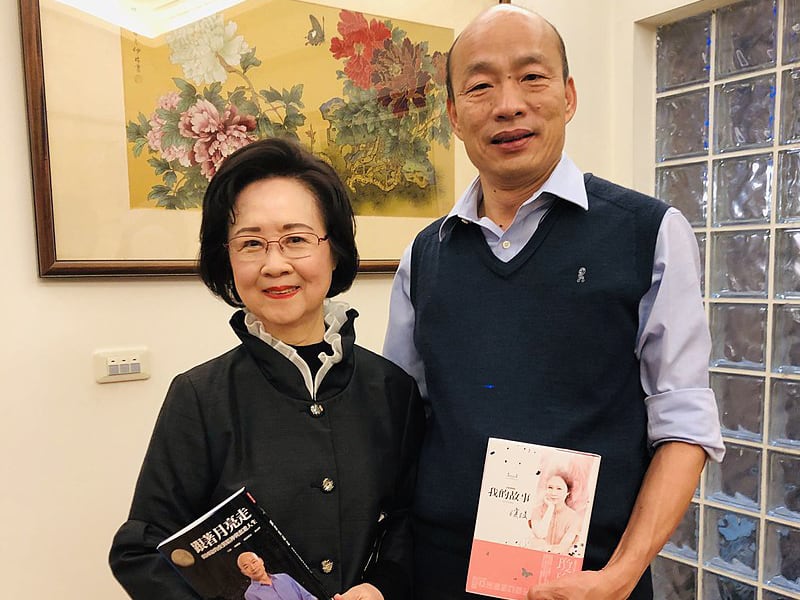Viewers in the Chinese-speaking world are mourning the death of Taiwanese romance author Chiong Yao, who took her own life at the age of 86.
Chiong, who was born in the southwestern province of Sichuan with the name Chen Che, and whose family fled to Taiwan at the end of the civil war in 1949, was known to millions of viewers of TV dramas that were adapted from her prolific stream of romantic novels from the 1960s onwards.
Her death in Taipei was reported by China’s state news agency Xinhua, which noted that the news “climbed up to the top trending topic on the popular microblogging site Weibo minutes after it broke.”
“Within an hour or so, more than 1 billion views on relevant posts were recorded by Weibo,” the agency said, using an alternate spelling of her name, Qiong Yao.
Xinhua said that according to the local police and fire department, the writer “was found deceased after taking her own life at her residence.”
Several Chinese media quoted a farewell video from Chiong posted to Facebook in which she says good-bye to her life, and leaves behind her books as her legacy.
“No matter what happened, good or bad, part of me was always chasing the sunrise and sunset, always believing in love and idealism,” she says.
“I don’t want to burden my loved ones with more disease; my heart is at peace.“

Chiong’s passing prompted a massive outpouring of grief on social media, particularly in China, with posts linked to the news trending on Weibo on Wednesday, with readers and viewers hailing her for writing “China’s own Romeo and Juliet,” Xinhua said.
One of Chiong’s works, the Qing Dynasty love story “My Fair Princess,” went on to be adapted into one of the most-viewed Chinese-language TV dramas in history, aired by Hunan TV from 1998-1999.
That novel, along with “Wan Chun” and “Romance in the Rain,” made her into a household name in the Chinese-speaking world.
Hit on the mainland
Her novels have long been popular on both sides of the Taiwan Strait, but really took off in China following the economic reforms launched in 1979 by late supreme leader Deng Xiaoping, as an antidote to the political turmoil and violence of the Mao era.
Chinese publishing houses rushed to bring her novels to print in China in the 1980s, with many publishing without her permission.
Luo Xiaohu, editor-in-chief of the Chinese-language Boston Review of Books, said Chiong’s work was “hugely influential.”
“She influenced so many people in the 1980s,” Luo said. “A whole lot of people named their kids after characters in her novel.”
China back then had just seen the end of the Cultural Revolution, Luo said, and Chiong’s novels were a refreshing change from the grand political narratives that had been imposed on cultural works under Mao Zedong’s wife Jiang Qing.
“The generation that came through the Cultural Revolution in China had had no education, no popular literature, and no books in a decade, and Chiong Yao met their needs,” she said.
In Taiwan, her books took off in the wake of the authoritarian repression of pro-democracy activists under the Kuomintang known as the White Terror.
Her novels offered a glimpse of a romantic world in which dreams of love were the main point of being alive.
People who read her work were also listening to romantic Mandarin pop songs from Taiwan and watching kung fu movies from Hong Kong, according to Luo.
A woman who gave only the surname Wu for fear of reprisals said she had been obsessed with “My Fair Princess” as a young girl growing up in China.
“I didn’t even know who Chiong Yao was, but I was obsessed with My Fair Princess,” Wu said. “I would binge more than 10 episodes a day during vacations, and I used to buy stickers, and unauthorized merch like notebooks.”
She said part of the appeal was the show’s light-heartedness, including its slapstick comedy and fight scenes.
“It was hot property,” Wu said.
The show was a turning point for Chiong Yao adaptations, spawning a huge industry that saw many major Chinese TV stars get their first big break, including Zhao Wei, Fan Bingbing and Wang Yan, who posted messages of mourning and condolence for Chiong on social media.
While her storylines and characters were also criticized for their lack of realism, many read and watched them anyway, because they fulfilled a need for escapist fantasy.
RELATED STORIES
What do women want? Mandarin pop song lyrics reveal a shift, study shows
Bestselling Chinese Martial Arts Fantasy Author Dies in Hong Kong
China targets younger Taiwanese with junkets for island’s celebrities
“Reading Chiong Yao makes you feel much better, because her plotlines for romantic pairings are pretty effortless and brainless,” wrote one reader on social media. “There are often several pairings that play off against each other.”
“They live carefree lives, always have money, and enough leisure time to be happy,” they wrote.
As Chiong herself once explained to Chinese director Shi Shujun: “Some people say my novels and plot lines are unrealistic, but the feelings are real.”
“I think of them as being like a Christmas tree: we know the baubles are manufactured, but they hang their, glittering and shiny, and everyone loves to look at them,” she said.
Given current military tensions in the Taiwan Strait, Chiong’s work also symbolizes a more innocent era in which Taiwanese weren’t constantly aware of the threat of a Chinese invasion, and celebrities from both sides of the Strait mingled effortlessly on TV and at award ceremonies, Wu said.
“Her work was able to spread to China because there was a significant increase in economic and cultural exchanges across the Taiwan Strait [in the 1980s and 1990s],” she said. “I don’t think we will be seeing another Chiong Yao for some time to come.”
Translated by Luisetta Mudie. Edited by Malcolm Foster.
